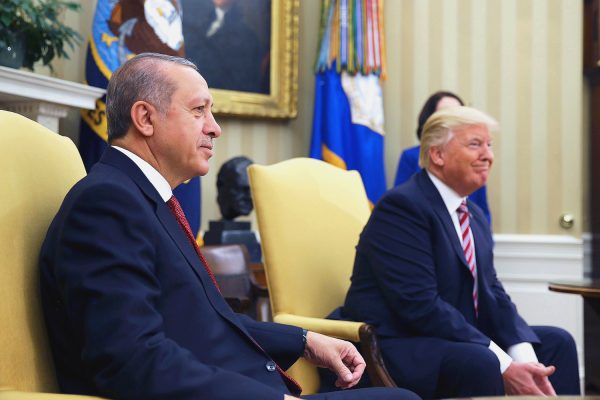
The calamity of Donald Trump’s withdrawal from northern Syria is hard to overstate.
- More than 160,000 people have fled the region.
- A Kurdish politician and at least ten others have been killed.
- Hundreds of fighters from the self-declared Islamic State (ISIS) — which the Kurds did more than anyone to defeat — have been freed from prison.
- Trump doesn’t care, saying, “They’re going to be escaping to Europe.” No matter that’s where America’s best friends are, or used to be.
- Turkey has attacked an American commando outpost in Syria.
- Abandoned by the West, the Kurds are appealing to Bashar Assad and his patron, Vladimir Putin, for help.
Even Trump, who never admits a mistake, seems to understand that something has gone wrong. He has sanctioned Turkish officials and threatened to double tariffs on the country’s steel (which he halved in May).
But it was Trump’s withdrawal of some 1,000 American soldiers from Syria that gave Recep Tayyip Erdoğan the green light to launch an offensive against Kurdish fighters Turkey considers terrorists.
Analysis
Trump’s defense, that he is extricating the United States from “endless wars” in the Middle East, doesn’t hold up.
His own former defense secretary, James Mattis, told Meet the Press on Sunday:
We may want a war over. We may even declare it over. You can pull your troops out, as President Obama learned the hard way out of Iraq, but the enemy gets the vote, we say in the military. And in this case, if we don’t keep the pressure on, then ISIS will resurge. It’s absolutely a given that they will come back.
Roula Khalaf argues in the Financial Times that a win for Assad is a win for Iran, the only state Trump has consistently sought to undermine.
His “maximum pressure” policy, however, seems to end at the Syrian frontier.
Russia too is gaining from the chaos unleashed by the American president:
Moscow has stepped in to reinforce its position as the powerbroker in Syria, negotiating the deal between the regime and the Kurds.
David Rothkopf goes a step further, writing in The Daily Beast that Trump has aligned America with the “Axis of Evil” in the Middle East:
Turkey, though ostensibly a NATO ally, has not acted like one for years. Erdoğan’s goal is clear — destroy the Kurds, who played a central and valiant role helping the US role back the ISIS influence.
Assad is a despot with the blood of hundreds of thousands on his hands. Iran is even cited by Trump as an enemy. And Russia is one of our top geopolitical rivals. Yet, they are the team we have joined.
All without input from America’s own national-security professionals.
Trump is on his fourth national security advisor, but doesn’t seem to listen to this one either. He is “at war with the intelligence community,” according to Rothkopf; has alienated the military, and in Mike Pompeo has a secretary of state who “has proven to be more of a sycophant and a political fixer than a diplomat.”
So Trump, in his “great and unmatched wisdom,” just did what Erdoğan asked without thinking through the consequences.
Global consequences
And those consequences could be global, warns Edward Luce, also of the Financial Times:
- In Ukraine, President Volodymyr Zelensky has cut a deal with Russia to hold elections in its east, where Russia is fighting a proxy war. “Hard to believe that would have happened if Kiev retained any faith in the US.”
- In East Asia, China’s neighbors are squeezed between an America they depend on militarily and a China they rely on for growth.
- In Europe, “it seems to be Christmas every day for Putin.”
- And in the Middle East, it is Russia that is seen as the rational external power.
